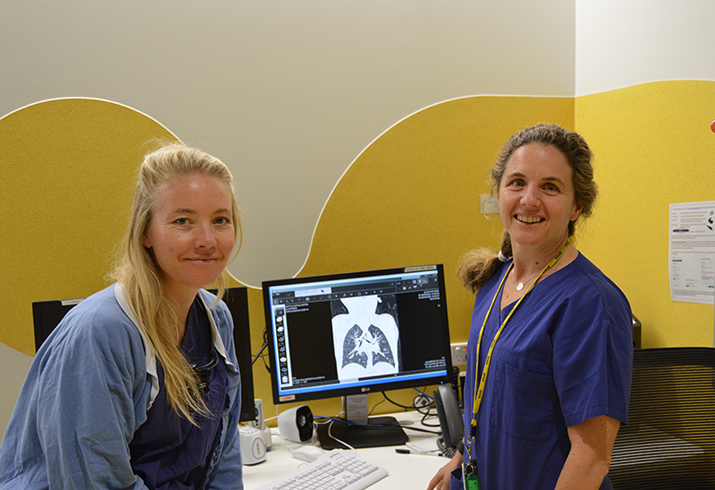Surgical study uncovers unlikely cause of airway blockages in young children
 Dr Allison Reid, ENT Registrar and Dr Hayley Herbert, Head of Ear, Nose and Throat Department at PCH
Dr Allison Reid, ENT Registrar and Dr Hayley Herbert, Head of Ear, Nose and Throat Department at PCH
A research project led by the Ear, Nose and Throat (ENT) surgical team at PCH has uncovered an unforeseen finding in reviewing cases of children who required surgery to remove inhaled foreign bodies blocking their airways.
The study, published last year in the International Journal of Paediatric Otorhinolaryngology, reviewed 127 cases of children and infants who presented to the Emergency Department between 2007-2016 with suspected inhaled foreign bodies.
The study found more than 80% of these cases that required surgery to remove the inhaled foreign body trapped in their airway were caused by either nuts or raw carrot given to the child by a parent or adult.
Head of the ENT Department at PCH Dr Hayley Herbert said these emergency cases were often life threatening and many involved children who needed to be airlifted to Perth from regional locations which posed additional challenges.
“These cases always require a multi-team emergency response with support from several departments at the hospital such as radiology, respiratory and paediatrics to investigate the suspected cause and then mobilise the surgery, respiratory and anaesthetics teams to remove the foreign body,” Dr Herbert said.
Dr Herbert said her team was surprised to find that most of these incidents had arisen from parents intentionally feeding nuts or raw carrot to their child.
She said the research underlines the value of continually reviewing data through research studies like this to promote safety and reduce risks to children.
“While we continue to work on the translational aspects of this research, we’d like to make parents or carers aware that any nuts, raw carrot or other hard foods should not be given to children under three years of age to significantly reduce the risk of an airway blockage,” she said.
Dr Herbert said from an inhalation point of view nut pastes, nut meals or ground nuts in other foods are the safest way to feed nuts to young children and hard vegetables such as carrot should be cooked to soften.
The Australasian Society of Clinical Immunology and Allergy (ASCIA) Guidelines for Infant Feeding and Allergy Prevention recommend nuts as an important food to include in a child’s diet at an early age to prevent the development of food allergies.
“These simple safety measures when feeding toddlers hard foods can dramatically reduce their risks of inhaling these food sources,” said Dr Herbert.
Kidsafe General Manager Aisling Pawlowski said the research reinforces the importance of preventing choking incidents from occurring.
“We know that food is the most common cause of choking in children, accounting for over half of all choking cases.
“We also know that there are several simple actions we can take to help reduce the risk of a choking incident occurring including avoiding giving hard food to young children, ensuring raw foods such as carrot and apple have the skin removed and are chopped into small pieces, preparing food appropriately by removing the skin, grating, mashing, or chopping food into small pieces and always supervising young children while they are eating, making the best effort possible to have children sitting still."
More information on choking in young children can be found on Kidsafe WA’s website.
Image | Dr Allison Reid, ENT Registrar and Dr Hayley Herbert, Head of Ear, Nose and Throat Department at PCH

